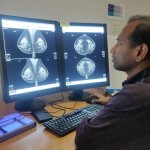Article • Intelligent health
Introducing AI across the NHS
Artificial Intelligence in health and care is being introduced across the UK via a major national project that is already producing a range of innovations. Latest developments were outlined to the online Intelligent Health conference in a headlining presentation by Dr Indra Joshi, Director of AI at NHSX, which is a joint unit bringing together teams from NHS England and NHS Improvement, and the Department of Health and Social Care to drive the digital transformation of health and care.

In her presentation “The NHS AI Lab – How the NHS is enabling the safe, ethical and effective adoption of AI in health and care,” she explained that the AI initiative had three core aims: to Digitise, Connect and Transform. “We aim to level up the NHS and social care services to ensure they have a core level of infrastructure, digitisation and skills,” explained Dr Joshi.
That means joining services together through technology to allow health and care providers to share information and take a shared approach to procurement and planning, and then use the platform of a “digitised, interoperable, connected health and care system” to deliver services more effectively.
With the AI Lab a “focal point for accelerating AI technology” in the NHS, she continued: “We want to ensure we build a system that enables AI technology to be deployed and used on the frontline in everyday practice. To do that, we need to ensure the infrastructure works, and we need to work alongside the workforce and users of that technology.”
NHS AI Lab is seeking to drive change by bringing AI technologies into use with access to high quality data sets, encourage staff to understand the benefits of AI, and develop the expertise to use it. But she stressed: “Clinicians and the public must have the confidence in the AI-driven technologies and systems they are using to use them to their full potential.”
NHSX is working with professionals across health and adult social care to highlight where AI can make a difference, efficiently and safely. “We are using experts across the field to make sure we get best tools, but also that it has all we want to see in clinical technology; efficiency, safety and that it is working for the economy,” said Dr Joshi.
It is not just about deploying those technologies; it is about evaluating them and making sure they are doing what we need them to do on the frontline, but also working with commissioners and procurers to understand how we add longevity to this
Indra Joshi
There are five delivery programmes: the AI in Health and Care Awards (with £140m for development and deployment of technologies from early stage to market ready technologies); Skunkworks (a small team working with developers and technical experts on a well-defined problem towards delivery); AI Regulatory Programme; AI Ethics Initiative; and Imaging. These are underpinned by supporting programmes that make sure different outputs are embedded strategy and policy, collaboration and engagement, and programme management.
To win funding awards for projects, the technical feasibility of a product or concept has to be demonstrated, and undergo real-world testing and prototyping towards adoption.
Examples of early-stage technologies include SamurAI, which uses AI to combine historical data for patients prescribed antibiotics with the findings of specialists in infections as they review prescriptions; and Woubot, which is automated software for wound clinics. A more advanced project is focusing on automating early lung cancer detection. Dr Joshi added: “It is not just about deploying those technologies; it is about evaluating them and making sure they are doing what we need them to do on the frontline, but also working with commissioners and procurers to understand how we add longevity to this.” She also highlighted Data Lens project, which helps address the issue of the large amounts of health data in the NHS held on incompatible databases and brings it together to give wider access to it.
Recommended article

Article • The iCAIRD project
AI to aid Scottish breast screening
Implementation of artificial intelligence into Scotland’s national breast screening service is moving closer following an initial success with a trial project. While Scotland’s breast screening trial has delivered highs and lows, significant hurdles have been overcome in terms of approvals, governance and patient acceptance.
NHS AI Lab, continued Dr Joshi, has initiated a programme with regulators to enable a clear, safe, and ethically-robust regulation ecosystem for AI-driven technologies in health and care, while also striving to counter any inequalities that may arise from AI deployment.
As part of the imaging stream, in response to the Covid-19 pandemic, NHSX worked with a number of institutions to develop the National Covid-19 Chest Imaging Database containing X-ray, CT and MRI images for use by clinicians.
As a next step, she said: “The NHS AI Lab is investigating building a National AI Medical Imaging Platform to make it possible to safely and securely collect and share imaging data on a national scale, helping AI screening technologies to be developed and tested more quickly.”
Future plans for AI in health and social care include the launch in 2022 of the National AI Strategy for Health and Adult Social Care, further awards for projects, ethical AI research, and clarifying regulation protocols. (MN)
Profile:
Dr Indra Joshi is the Director of AI for NHSX, overseeing the NHS AI Lab project. Her experience stretches across policy, governance, digital health and marketing, national project strategy and implementation. With professional training as an emergency medic, she is also the Clinical Director of One HealthTech – a network which champions and supports underrepresented groups in health innovation, particularly women.
20.05.2021










